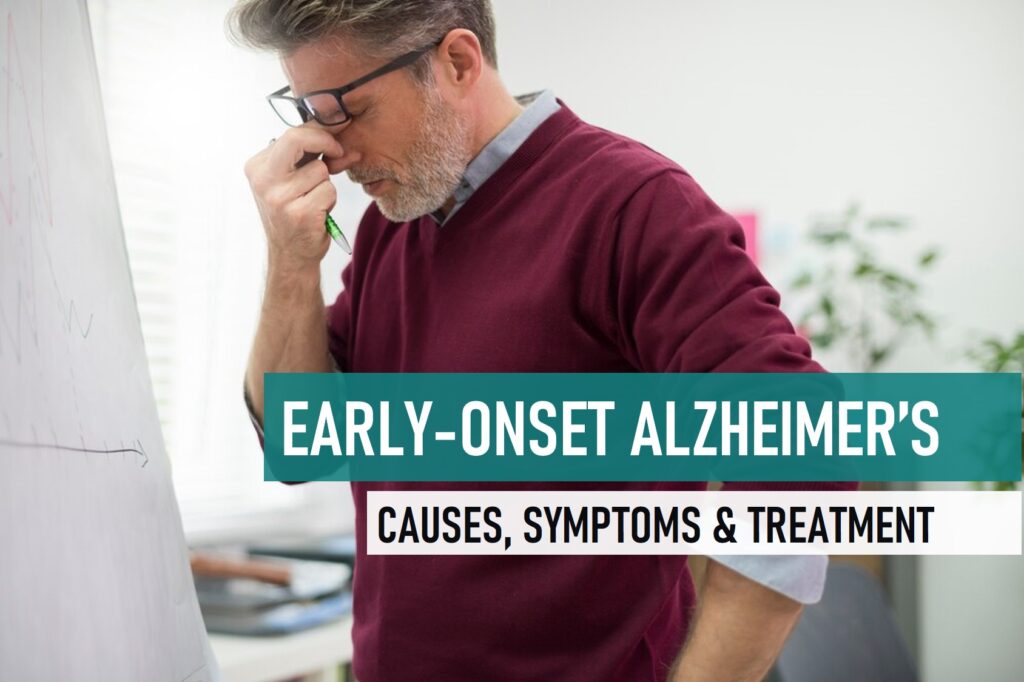What is Early-Onset Alzheimer’s Disease?
Early-onset Alzheimer’s disease is a rare form of Alzheimer’s that occurs in individuals younger than 65, typically in their 40s or 50s. The condition shares many similarities with late-onset Alzheimer’s, but it presents unique challenges due to the younger age of onset.
In this blog, we’ll delve into what early-onset Alzheimer’s is, its causes, risk factors, symptoms, and explore prevention and treatment options. If you or a loved one is in Ahmedabad and concerned about Alzheimer’s, seeking guidance from a neurologist or Alzheimer’s doctor in Ahmedabad is vital.
Causes and Risk Factors
The exact cause of early-onset Alzheimer’s disease remains unclear, but it is believed to result from a complex interplay of genetic, environmental, and lifestyle factors.
Genetics: Family history plays a significant role. Mutations in specific genes, such as APP, PSEN1, and PSEN2, are linked to the early-onset form of the disease. [Source: National Library of Medicine]
Down Syndrome: People with Down syndrome are at a higher risk due to an extra copy of chromosome 21.
Head Trauma: Severe head injuries, especially repeated concussions, may increase the risk.
Cardiovascular Health: Conditions like high blood pressure and high cholesterol might be risk factors.
Lifestyle Factors: Smoking, obesity, and poor diet could contribute to the risk.
Symptoms
The symptoms of early-onset Alzheimer’s are similar to late-onset Alzheimer’s but may be initially mistaken for stress or other issues. These include:
- Memory Loss: Forgetfulness, repeating questions or stories.
- Difficulty with Familiar Tasks: Struggling with everyday tasks.
- Changes in Language: Difficulty finding the right words.
- Disorientation: Getting lost in familiar places.
- Mood and Personality Changes: Irritability, depression, withdrawal.
- Poor Judgment: Making bad decisions.
SEE ALSO: 7 Stages of Alzheimer’s Disease
Preventions & Treatment for Early-onset Alzheimer’s Disease
Preventing early-onset Alzheimer’s involves managing risk factors. While some causes are beyond control, there are steps you can take:
Healthy Lifestyle: Maintain a balanced diet, exercise regularly, and manage stress. Avoid smoking and excessive alcohol consumption.
Brain Stimulation: Engage in mentally stimulating activities, such as puzzles and learning new skills.
Heart Health: Manage cardiovascular risk factors through regular check-ups and medication as advised by a healthcare professional.
Genetic Testing: If there’s a family history of Alzheimer’s, consider genetic testing and counseling for early detection and planning.
Wrapping Up…
When it comes to early-onset Alzheimer’s disease treatment, while there’s no cure for Alzheimer’s, early diagnosis and intervention can help manage symptoms. Treatment options may include medication to temporarily improve memory and cognitive function. Additionally, support from a healthcare team, including a neurologist or an Alzheimer’s doctor in Ahmedabad, can be crucial in developing a personalized care plan.
Looking for a Alzheimer’s specialist in Ahmedabad? Consult us now!
Source/s: Banner image by Freepik

